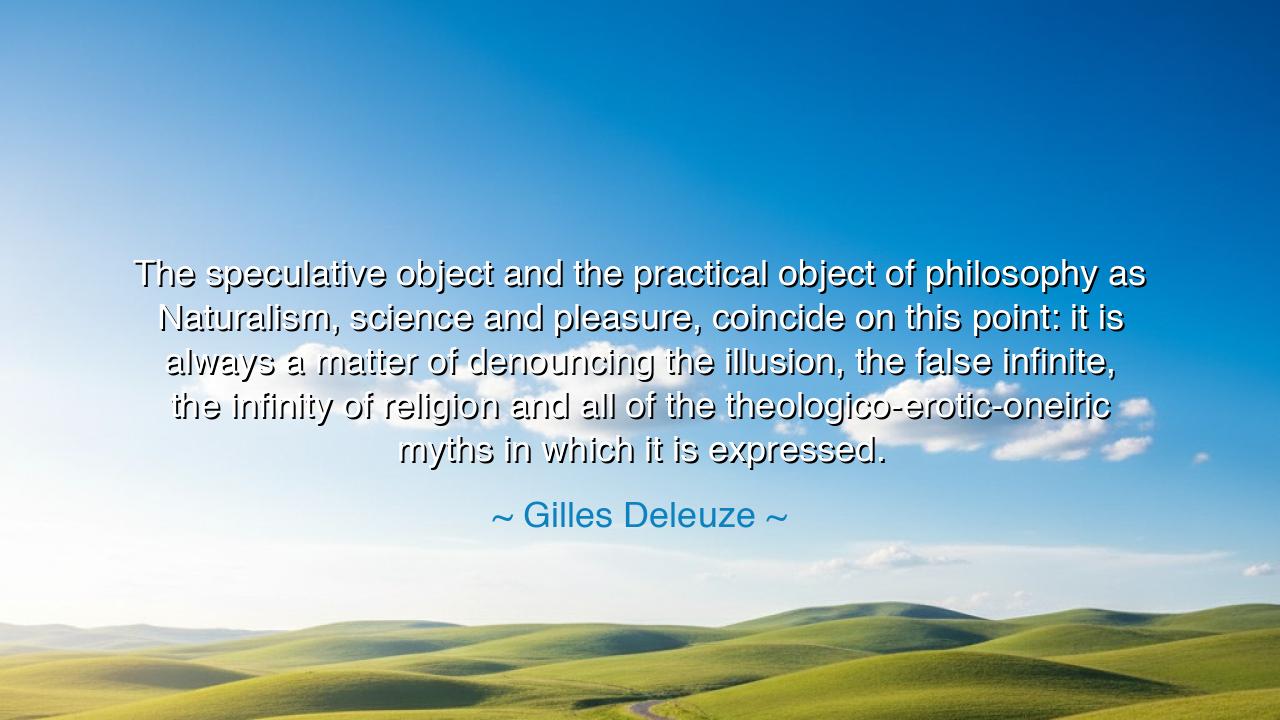
The speculative object and the practical object of philosophy as
The speculative object and the practical object of philosophy as Naturalism, science and pleasure, coincide on this point: it is always a matter of denouncing the illusion, the false infinite, the infinity of religion and all of the theologico-erotic-oneiric myths in which it is expressed.






Hear, O seekers of wisdom, the words of Gilles Deleuze, that philosopher of the twentieth century whose thought cut like a blade through the veils of illusion: “The speculative object and the practical object of philosophy as Naturalism, science and pleasure, coincide on this point: it is always a matter of denouncing the illusion, the false infinite, the infinity of religion and all of the theologico-erotic-oneiric myths in which it is expressed.” Though wrapped in difficult language, his meaning is as fire beneath the ashes: philosophy must unveil the truth, stripping away the masks of false infinities, the dreamlike myths that promise endlessness but bind the soul in chains of illusion.
For what is this false infinite that Deleuze speaks of? It is the eternal promise of something always beyond reach, spun by religion and its myths—visions of infinite heavens, eternal judgments, pleasures without end or terrors without escape. These promises, wrapped in sacred garments, claim to give meaning, but often they rob man of his present. They defer life into another world, binding the spirit not to reality but to shadows. Philosophy, naturalism, and science stand together to reveal these illusions for what they are: not truths, but dreams—oneiric constructions born from fear, desire, and longing.
Yet do not mistake Deleuze’s words as mere rejection. His call is not to destroy all meaning, but to ground meaning in the real, in life as it is lived, in the pleasure of existence, in the pursuit of knowledge that frees rather than enslaves. For what greater curse than to live chained to phantoms, bowing before infinities that are but mirages? The task of philosophy, he teaches, is to unmask these false infinities and to return man to the finite world—the world of earth, of bodies, of experience—where truth may be lived rather than only dreamed.
Consider the story of Galileo Galilei, who looked through his telescope and shattered the false infinite of his age. The heavens, once thought to be perfect and divine, were revealed to be scarred with mountains and moons, governed not by myth but by law. The theologians clung to their infinity, the eternal perfection of celestial spheres. But Galileo, with courage, denounced the illusion and revealed a more wondrous truth: the cosmos itself was not a dream of perfection but a vast, dynamic reality. Here we see Deleuze’s insight: philosophy and science coincide when they strike down the illusion to reveal the real.
But why does Deleuze speak of the theologico-erotic-oneiric myths? Because much of religion, in its tales, appeals to desire—desire for eternal love, eternal pleasure, eternal comfort—or conversely, eternal punishment and fear. These myths are erotic in their longing, theological in their authority, and oneiric in their dreamlike unreality. They enchant the imagination but remove us from the immediacy of life. Philosophy’s task, then, is to call man back, to awaken him from this dream, to say: “Do not lose yourself in shadows. The real, the finite, the living—this is where truth and freedom dwell.”
The lesson for us is profound: we must not waste our lives in pursuit of endless illusions. Do not live only for a heaven beyond the grave while neglecting the earth beneath your feet. Do not surrender your reason to myths that enslave your heart with promises of false infinity. Instead, embrace naturalism, which honors life as it is; embrace science, which seeks truth in what can be known; embrace pleasure, not as hedonism, but as the affirmation of existence, the joy of being alive in this finite world.
So, children of the future, hear this charge: be bold in denouncing illusion, whether it comes clothed in religion, ideology, or empty promise. Seek not the false infinite, but the infinite depth of the finite—the richness of this life, this body, this world. For only here, in the living present, can true wisdom and freedom be found. And in following this path, you will not be cursed by shadows, but blessed with the light of reality.






AAdministratorAdministrator
Welcome, honored guests. Please leave a comment, we will respond soon